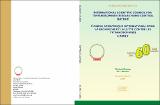30th Reunion Meeting - Publication No. 125, Kampala Uganda 2009; International Scientific Council for Trypanosomiasis Research and Control (ISCTRC)

(en=English; ar=Arabic; fr=French; pt=Portuguese)
Language
enDate
2009Author
AU-IBAR
Type
ReportItem Usage Stats
528
views
views
51
downloads
downloads
Abstract
The 30th ISCTRC Meeting was held at the Speke Commonwealth Resort in Kampala, Uganda between the 21st and 25th of September 2009. The meeting coincided with the 60th anniversary of the ISCTRC and the theme for the meeting was “Towards consolidating strategies to manage trypanosomiasis in Africa”. It was opened by the Rt. Hon. First Deputy Prime Minister and Minister for East African Federation Hon. Enya Kategaya who read a speech on behalf of the President of the Republic of Uganda, His Excellency, Yoweri Kaguta Museveni. The Deputy Prime Minister highlighted the impact of T&T on rural development and human welfare on the African continent and urged scientists to focus on research areas that would contribute to the effective management of T&T. The opening ceremony was also graced by the presence of Hon. Hope Mwesigye Minister for Agriculture, Animal Industry and Fisheries and the Director AU-IBAR, Prof Ahmed Elsawalhy who also read a speech on behalf of the Commissioner for Rural Economy and
Agriculture, Madame Rhoda Peace Tumusiime.
Description
Trypanosomiasis severely affects human and livestock health, limits land use thus causing poverty and perpetuating underdevelopment on the continent. The impact of the disease extends over 36 countries and an estimated 10 million sq. km (a third of the continent) of land area. The International Scientific Council for Trypanosomiasis Research and Control (ISCTRC) was established in the 60s on the realization that the removal of tsetse and trypanosomiasis required an international organization that would serve as a vehicle of cooperation and implementation across national, regional and continental barriers. ISCTRC is a statutory council of the African Union with the secretariat at AU-IBAR and is managed by an Executive Committee. It has continued to act as a platform for knowledge sharing and information dissemination on trypanosomiasis research and control.